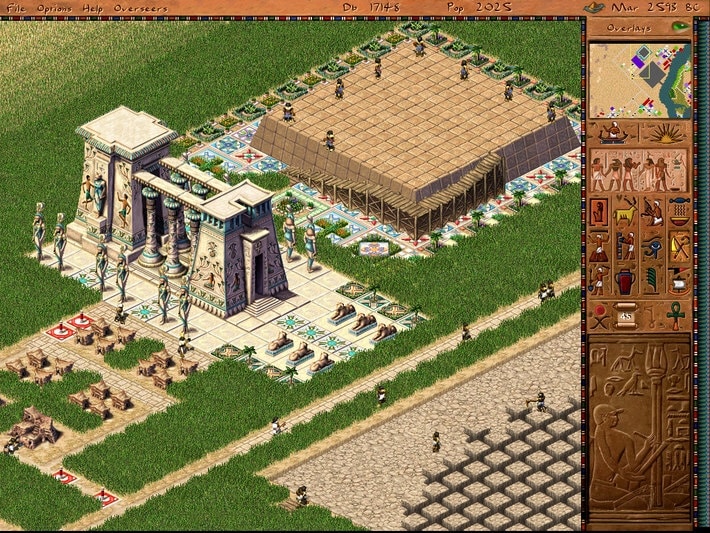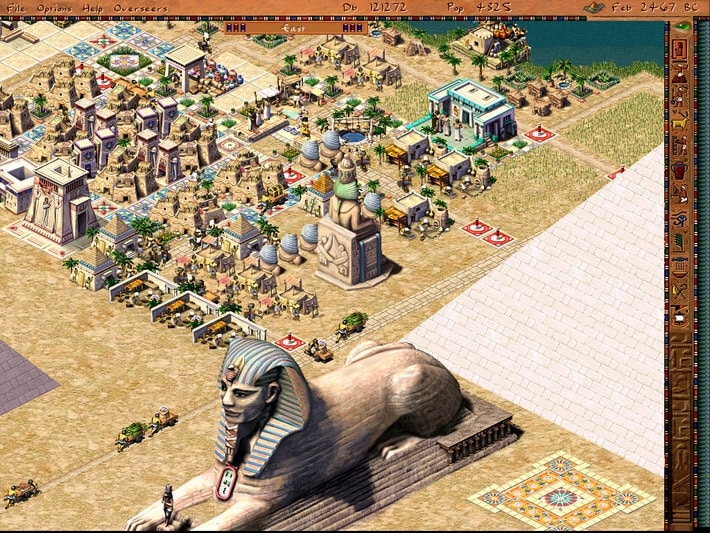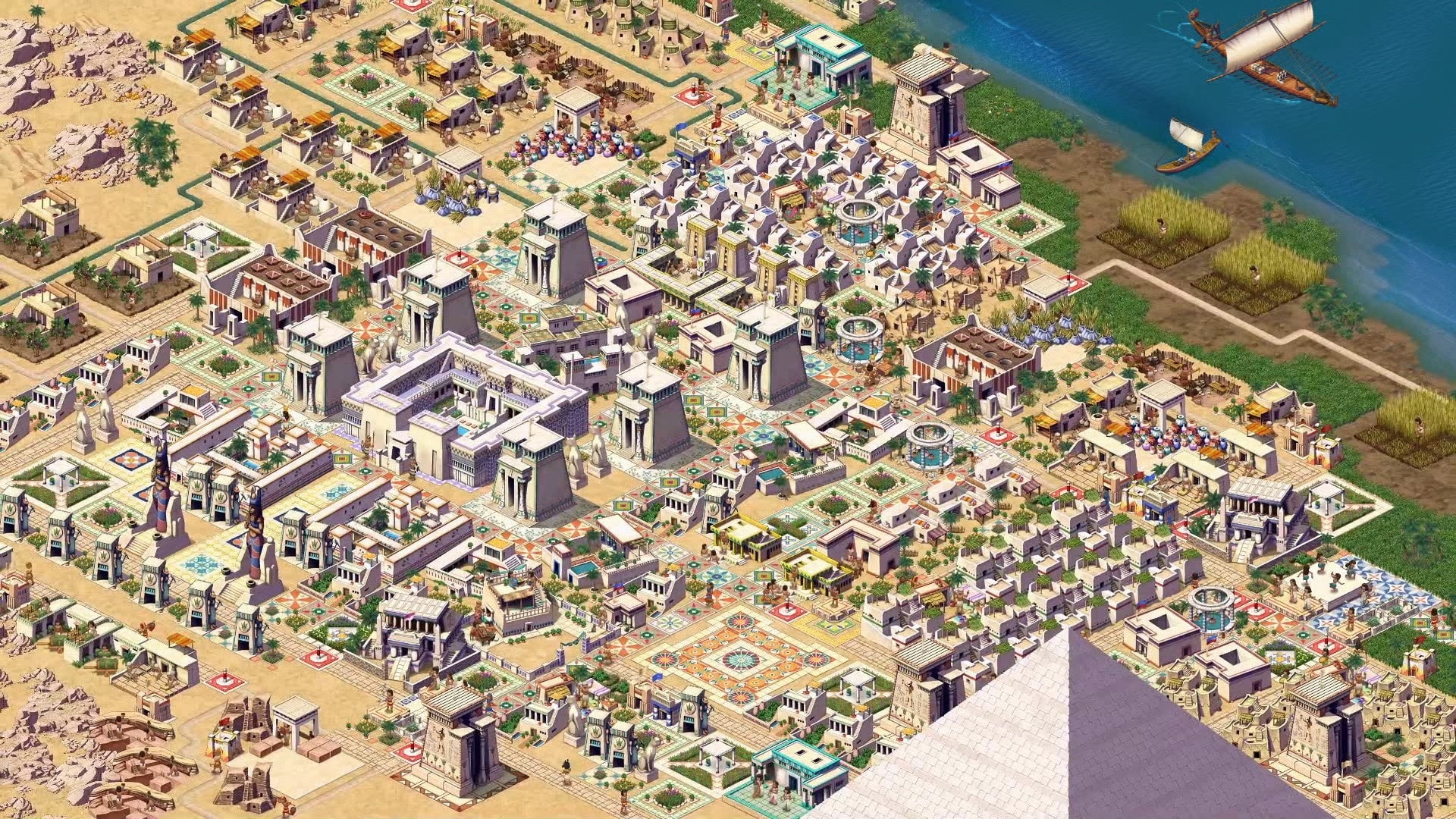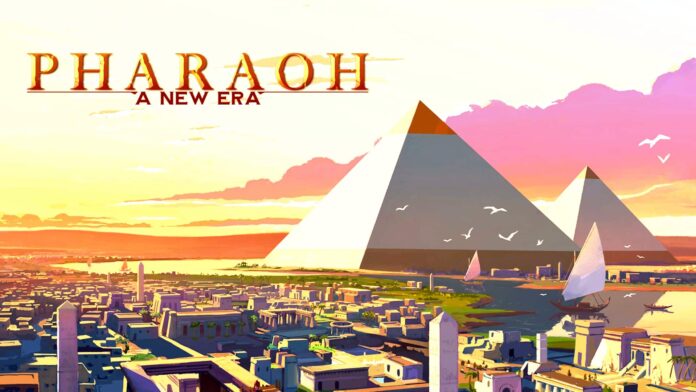opinion: Dani still plays Pharaoh regularly in 2022, because the legendary city-building sim is her absolute genre favourite, which can”t even be replaced by Anno.
Uff. Deep breath. I”ve been sitting in front of this blank page for longer than I”d like to admit. Because writing about something that means so much to you sometimes feels like a real monumental project. But if you”re reading this article, then Future Géraldine has probably somehow managed to express her love for Pharaoh after all. And for that, let”s first take a look at past-Géraldine.
It”s a beautiful Sunday in the year 2000. The PCs have fortunately not exploded worldwide at the turn of the millennium, “Spirit of the Hawk” by Rednex is playing on the radio and little Past-Géraldine is happy because she still has a full raspberry-flavoured Hubba-Bubba roll.
Then she finds an unassuming CD-ROM on her father”s desk that will decisively shape the course of her life. A grey, unadorned sticker with no motif and just one word on it: Pharaoh.
Little Géraldine had an almost absurd obsession with Egypt at the time and begins to discover the world of construction strategy together with her father. Long before she even knows what building strategy means. When she realised at some point that it was even a whole genre, she plunged enthusiastically into new games – expecting to experience the same greatness there. Only to find that Pharaoh has remained unique to this day.
You see, there”s a large portion of nostalgia involved in my love for Pharaoh, but it”s much more than that. After all, I”ve been replaying Pharaoh at least once a year since then, and every time I do, I realise: this kind of game has left a hole in my heart that even Anno can”t fill.
More than just the great setting
Clearly, ancient Egypt was what originally drew me into the spell of Pharaoh. But also, with how much attention to detail this setting is implemented in every corner of the game.
Each of my residents is simulated individually and is a distinct character depending on the job. The market women carry colourfully painted jugs through the streets, the firemen patrol with filled water bags, the workers who build my huge monuments (I only say pyramids!) haul bricks weighing tons to the construction site.

Each of them I can click on and learn through a lovingly set dialogue line how they are doing and how their area of responsibility is. At that time I even used this method more often than the statistics menu. When the policeman told me with satisfaction that the crime rate in the neighbourhood was low, I too could sit back and relax.
I can only dream of this kind of simulation of individual inhabitants in Anno. Even the goods in Pharaoh are simulated individually down to the last papyrus roll and visually represented. In my warehouse I can specify exactly which goods I accept and which I do not. I can see this in turn in the carpet rolls, clay jars and stone blocks that are piled up there. This way I can manage that there are warehouses for very specific resources. Nothing there with warehouses that all share the same resources and function like a magic portal (yes, I”m looking at you again, Anno 1800).
The placement of warehouses, residential areas and production facilities becomes a real puzzle that I have to keep adjusting.
Unique atmosphere and lots of (unintentional) wit
But in the same way, I puzzle with the ornaments, which, by the standards of the time, form amazingly organically into a real feast for the eyes. If I place several park modules next to each other, they automatically become a larger park complex, the decorative floor tiles, in turn, have one of many random motifs and result in a beautiful mosaic – or directly an entire square if I combine them.
The atmosphere of Pharaoh is beautiful. The sound design captivates me every time from second one. The murmuring in the marketplace, the hustle and bustle on the construction site, the busy work in the production facilities. The water level of the Nile determines when my workers will work in the fields or when they will have time to tackle my grand monumental projects. At the same time, I have to produce enough food supplies in time for the flood.
From time to time, an army of hippos charges into my town and tramples the inhabitants. Dramatic, really, but my father and I could laugh our heads off about it back then. The same goes for the sheer tragedy when we had to demolish an apartment building. Then we would expose a poor family at their breakfast table, who would linger for a second, dumbfounded, without a roof over their heads, and then sadly wander off with a sack over their shoulder.
I have never again made such a personal connection with inhabitants in a building game as I did in Pharaoh. With every house and every settlement I have an idea of what kind of people live there, what their workplace is and what deity they pay homage to.
They are also such a phenomenon: in theory, they can bring both bonuses and mali upon my people, if they are honoured accordingly with temples and festivals or ignored. In practice, they are begrudging arm candy who can”t get the dirt under their colleagues” fingernails. I can build Bastet 40 temples and 100 shrines, but woe betide Osiris if he has just one more! Then my warehouses will be set on fire.

Pharao is not perfect too
You see, Pharaoh isn”t always the holy grail of building games either. Not every mechanic is always perfectly balanced and not everything works as it should. The whole military aspect, for example, could have been easily dropped. If I only place infantry at each of the three possible spawn points for enemy troops and give automated orders, I usually don”t even notice that I”m being attacked – that”s how quickly my warriors pound the challengers into the ground. But I don”t miss anything there, war is, after all, proven to be the least fun part of any building strategy game.
The point is: Pharaoh, as well as the other representatives of Impressions Games Ceasar and Zeus, have torn a gap in the building strategy that could not be filled again until now. Not only has the setting of antiquity since been largely scorned, but the mechanics surrounding warehouse management, monument building, the cult of the gods and tides have never been seen again in this form.
I would never hope for Anno to become more like Pharaoh. Anno is designed exactly the way it is for a reason. Individual simulation of inhabitants and goods, for example, would upset the entire balance and focus of the game. Anno remains Anno. And Pharaoh remains Pharaoh. It”s just that the latter has not been continued for 23 years.
Yes, both the Stronghold and Tropico series deliver similar attention to detail in population simulation, but apart from that, with their castle sieges and political intrigues respectively, they set too different a focus for me to consider them as a replacement.
That”s why I”m setting my sights on two ships on the horizon: one has the big remake to Pharaoh loaded, bringing back this legendary building game in a modern guise. The other, in turn, carries Builders of Egypt, which is to be a kind of unofficial 3D remake of the classic. But that belongs to publisher Playway … and that”s another story altogether.
I hope future building game developers don”t forget what made Pharaoh, Ceasar and Zeus such great milestones that are still played with passion today. I hope that among all the Anno clones and Banished heirs, a city-building simulation will appear once again that brings back the spirit of Impressions Games. And I hope that one day I will be able to buy raspberry-flavoured Hubba-Bubba rolls in the supermarket again. One can still dream, after all.


